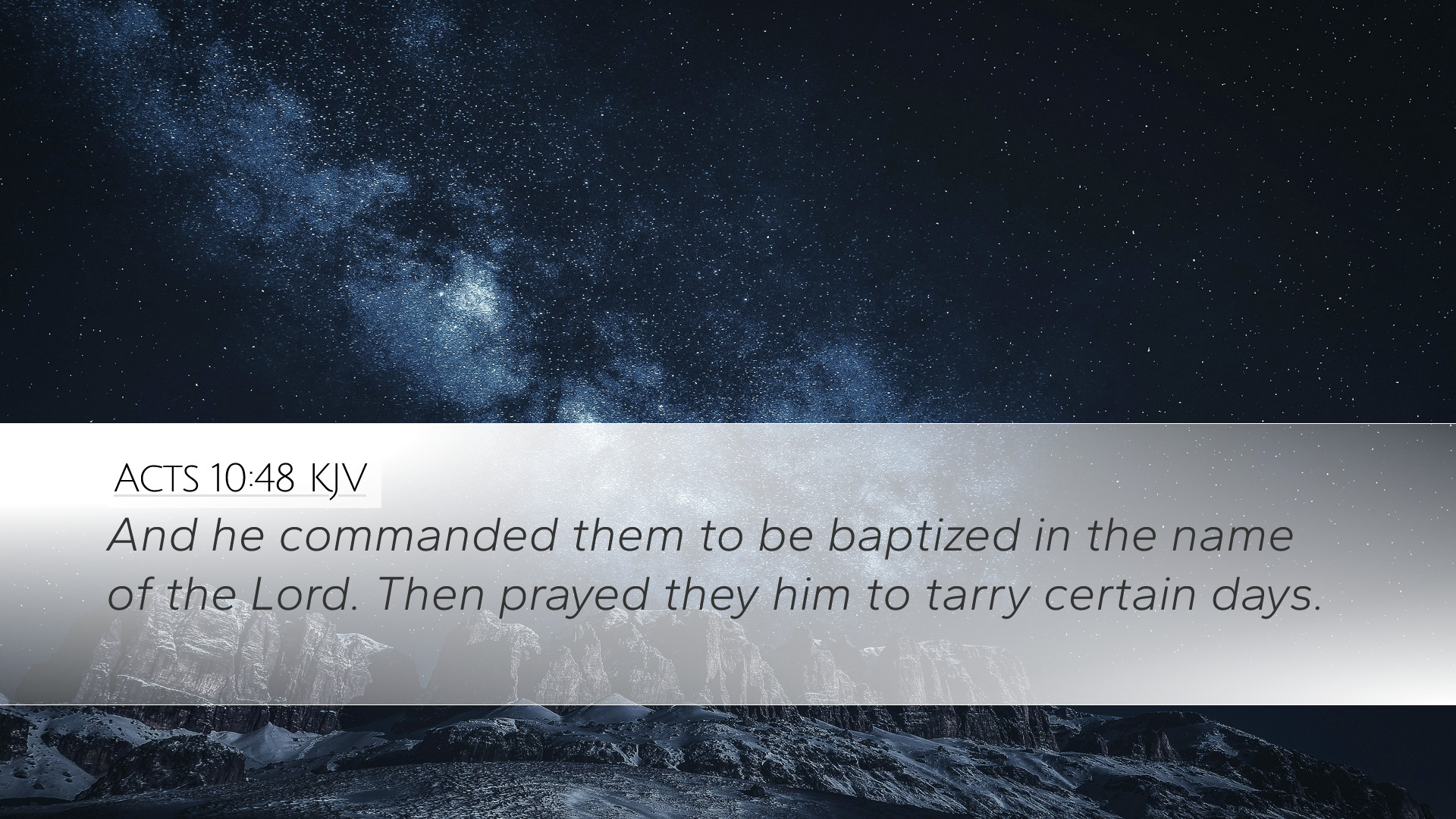Commentary on Acts 10:48
Acts 10:48 states: "And he commanded them to be baptized in the name of the Lord. Then they asked him to stay a few days."
This pivotal moment in the early church is laden with theological implications as it speaks to the expansion of the gospel beyond its Jewish roots. In Acts 10, Peter, the apostle, is directed by God to the household of Cornelius, a Gentile, indicating the breaking down of barriers that had previously separated Jews and Gentiles.
Contextual Background
In the early pages of the Book of Acts, the inclusion of Gentiles is a significant theme that showcases God's redemptive plan for all humanity. The narrative of Acts 10 not only recounts Peter’s vision but also illustrates the divine orchestration involved in bringing Cornelius to faith.
Insights from Public Domain Commentaries
Matthew Henry's Commentary
Matthew Henry emphasizes the authority with which Peter acts when he commands baptism. This act is not just a mere suggestion but a divinely ordained command that reflects the nature of Christian initiation. Henry notes that Peter's words, "in the name of the Lord," highlight the importance of the divine authority and the recognition of Christ's sovereignty in this sacramental act.
Furthermore, Henry asserts that the baptism of Cornelius and his household is a clear manifestation of the Holy Spirit's work in the Gentiles, indicating that salvation is available to all who believe, not just those of Jewish descent.
Albert Barnes' Notes on the Bible
Albert Barnes provides additional insights into the commandment of baptism. He remarks that Peter’s instructions signify a decisive act of faith and obedience to Christ's commission. This reflection highlights the necessity of baptism as an outward sign of an inward faith—a theme prevalent throughout the New Testament.
Additionally, Barnes points out the fact that the request for Peter to stay underscores the importance of teaching and nurturing the new believers. It emphasizes the communal and relational aspect of discipleship within the Christian faith.
Adam Clarke's Commentary
Adam Clarke offers a unique perspective on the phrase “in the name of the Lord.” He explains that this formula encapsulates the essence of Christian identity and community. Baptism in the name of Jesus signifies not just a rite, but a profound association with the life, death, and resurrection of Christ.
Clarke also highlights the transformative nature of this event. The calling of the Gentiles into the faith marks a significant turning point in salvation history, paving the way for the universal church. The request for Peter to remain reflects the desire for deeper understanding and fellowship within the newly formed body of believers.
Theological Implications
- Inclusion of the Gentiles: Acts 10:48 serves as a definitive act that illustrates God's plan for inclusivity in salvation. This passage symbolizes the breaking of cultural and ethnic boundaries and sets a precedent for the global mission of the church.
- Authority of the Apostles: Peter's commanding of baptism underlines the authoritative role the apostles held in establishing the church's practices and doctrines. It illustrates a model of leadership that is both servant-hearted and divinely appointed.
- Significance of Baptism: The act of baptism is underscored as an essential rite of initiation into the faith community, emphasizing that faith is demonstrated outwardly through this sacred practice.
- Role of the Holy Spirit: The preceding events in Acts 10, including the outpouring of the Holy Spirit upon Cornelius and his household, signify the Spirit's active role in guiding the early church's mission and affirming the legitimacy of Gentile inclusion.
Practical Applications for the Church Today
The insights drawn from Acts 10:48 can deeply inform both pastoral practice and congregational life:
- Emphasizing Inclusivity: The church is called to embrace and reach diverse cultures and communities, reflecting God's heart for all people. Pastors should encourage congregations to actively break down barriers and foster unity within diversity.
- Encouraging Discipleship: Just as Peter stayed with Cornelius and his household, churches today must prioritize teaching and nurturing new believers to ensure robust spiritual growth and community integration.
- Understanding the Sacraments: The significance of baptism should be revisited within congregations. Educating members on the importance of baptism as an expression of faith and community can lead to a revitalized appreciation for this essential practice.
- Staying Receptive to the Holy Spirit: The narrative encourages believers to remain open to the leading of the Holy Spirit in both individual lives and the corporate church experience, ensuring that God’s agenda supersedes human expectations.
Conclusion
Acts 10:48 stands as a landmark verse in the New Testament that encapsulates the essence of the church's mission to the world. By merging insights from various public domain commentaries, we can appreciate the text not just as a historical account but as a theological cornerstone that continues to challenge and inspire believers today.


